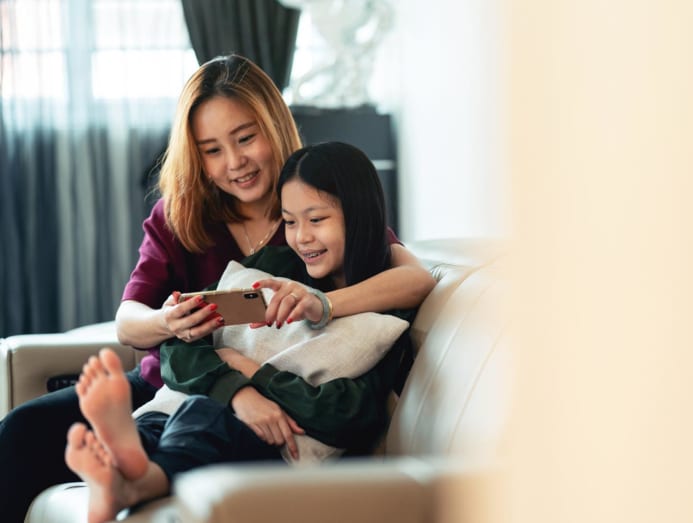How parents can actually help teens navigate social media: Experts offer realistic and effective ways
The American Psychological Association has urged parents to monitor adolescents for “problematic” social media use. Here are some tips to minimise teens’ exposure to cyberbullying, online hate and content.

A mother and her teenage daughter using handphones. (Photo: iStock/ChayTee)
The American Psychological Association (APA) issued its first-ever guidance on social media use in adolescence in May, a roundup of 10 recommendations for educators, policymakers, tech companies and parents aimed at helping teens engage with the technology in a safe and positive way.
The group said that adolescents should be monitored for “problematic” social media use and that it was important to minimise teens’ exposure to cyberbullying, online hate and content that causes them to compare their physical appearance with the appearance of others. It also emphasised the importance of teaching teens digital citizenship and literacy.
At the same time, the APA acknowledged that tech companies had a role to play in all of this, urging them to consider whether features such as endless scrolling and the “like” button were developmentally appropriate for teens.
But as all parents know, the burden primarily falls on them to monitor and educate their children and to stay on top of technology that is quickly changing. And trying to do this can feel frustrating and ineffective.
“As both a parent and psychologist, I recognise that the demands placed on parents are above and beyond what we have the capacity to do,” said Laura Gray, a psychologist at Children’s National Hospital in Washington, DC.
The New York Times reached out to Dr Gray and seven other experts – many of whom are parents of tweens or teens – to ask a simple question: What is one practical strategy that caregivers can use with their kids, starting now, to help mitigate the harms of social media?
EARLY ON, BE VERY HANDS-ON
The APA recommended that adults closely monitor social media use in children ages 10 to 14. Dr Gray agreed that this was a critical window for parents to teach good habits.
A family might decide, for instance, that a child will be limited to just one app at first, she said, and that for the first six months or so, the parents will review posts and friend requests with their child. The goal is to provide hands-on scaffolding.
As a mother of one tween and two younger children, Dr Gray knows how difficult it is to provide that kind of intensive supervision. But taking even five minutes a day to review a kid’s social media use is fine if that’s what families have available, she said.
Parents should also make sure that all accounts are set to private, Girard Kelly, the head of privacy for Common Sense Media, said, adding that social media apps “are designed to learn everything they can about their users so they can push personalised content that keeps kids and teens hooked”.

HOLD YOUR FIRMEST BOUNDARIES AT NIGHT
First, no screens after 9pm. Or really, no screens at a time of night that will affect your teen’s ability to get at least eight or nine hours of sleep, said Mitch Prinstein, the chief science officer at the APA and a co-chair of the advisory panel that wrote the new guidance.
“We know now that it’s the number one reason for disrupted sleep,” he said, “and we now have science to say disrupted sleep is literally affecting the size of teens’ brains.”
Second, no smartphones or tablets in the bedroom overnight. Just about every expert interviewed emphasised how important this was, including Jean Twenge, a psychologist who has spent years sounding the alarm over the ways social media has contributed to the erosion of teenage mental health.
“We know from so much research on sleep that people do not sleep as well, or as long, if their phone is within arm’s reach,” she said.
Dr Twenge recommended that all family members put their phones in a common space for the night – a practise her own family follows.
Dr Gray added that teens might push back against these types of boundaries, particularly if parents were trying to enforce them retroactively. In those cases, “it’s helpful to be able to provide some rationale around, ‘This is why we believe this is a loving parent response to you,’” she said. “Even though they may still have an emotional reaction.”
HELP TEENS UNDERSTAND HOW SOCIAL MEDIA AFFECTS THEIR BRAINS
The human brain develops from the back to the front, explained Dr Frances Jensen, the chair of the department of neurology at the University of Pennsylvania and the author of The Teenage Brain.
The middle part of the brain, which she describes as the “social brain”, is “actively constructing itself during adolescence” – and is the most susceptible to outside influences. The front part of the brain, however, which manages things like decision making, risk mitigation and emotional regulation, develops well into a person’s late 20s.
So teens “are really acting with a very highly active social brain, which is making them very vulnerable to peer pressure” as well as to novelty seeking, she said. And they are not getting feedback from the front of their brain that tells them to stop and take a beat.
Dr Jensen urged parents to talk to their kids about these brain changes and how they make them particularly vulnerable to some of the more negative effects of social media. All of the content, feedback and stimulation available online “is highly accessible to kids right when their social brain is developing”, she said, describing it as a “perfect storm”.

ASK: “DO YOU FEEL LIKE YOU HAVE CONTROL OVER SOCIAL MEDIA, OR DO YOU FEEL LIKE IT’S CONTROLLING YOU?”
That question is particularly effective at gauging whether a teen’s social media use has become problematic, said Jeff Hancock, the founding director of the Stanford Social Media Lab. He suggested opening with something like: “Hey, I sometimes have a hard time not being on my phone all the time. Do you ever struggle with that?”
If your teen says yes, that presents an opening to talk about management strategies. For instance, Hancock is teaching his 12-year-old (who thus far only has access to TikTok videos on YouTube) to set a timer for herself. She is working through what it feels like to take responsibility for her screen time, and figuring out how to cope when the timer dings and she wants to stay online.
ENCOURAGE TEENS TO ASK: “DO I FEEL BAD ABOUT MYSELF WHILE LOOKING AT THIS?”
Though the APA’s call to limit teens’ use of social media to compare themselves to others might feel nebulous, one approach is to teach teens to do a simple gut check by asking themselves, “Are any of these accounts making me feel worse about myself or about my body?” said Dr Jason Nagata, an adolescent medicine specialist with the UCSF Benioff Children’s Hospital San Francisco, who specialises in eating disorder treatment.
Though the negative effects of social media on girls’ body image have been widely discussed, Dr Nagata emphasisedthat parents should encourage this kind of practise with children of both genders.
“Even though it’s less understood and less covered, boys are also susceptible to these influences,” he said. “Studies have shown that Instagram use in boys and men is associated with meal skipping, disordered eating, dissatisfaction with muscles and even use of anabolic steroids.”
WITH OLDER TEENS ESPECIALLY, LEAD CONVERSATIONS WITH CURIOSITY, NOT JUDGMENT
The experts emphasised that it was important for parents to foster an open dialogue around social media throughout their kids’ lives.
Teens – particularly those who are older and may have more online freedom – often assume their parents are asking questions about their social media use because they intend to crack down or take their phones away, said Becky Lois, a child and adolescent psychologist at Hassenfeld Children’s Hospital at NYU Langone.
“The approach is really critical here,” she said. “We need to help kids understand why we’re asking the question. It’s not accusatory or critical or judgmental.” Tell them very clearly that you are asking because you are curious about this aspect of their life, not because they are in trouble, Dr Lois recommended.
She is also a realist. Teens may not be honest or want to talk to you about it, she said, but a parent’s job is to keep asking.
Dr Lois added that it’s important “to connect with them to get to know this part of their life, and also to make sure they know that it is a safe space to talk about what they’re seeing”.






